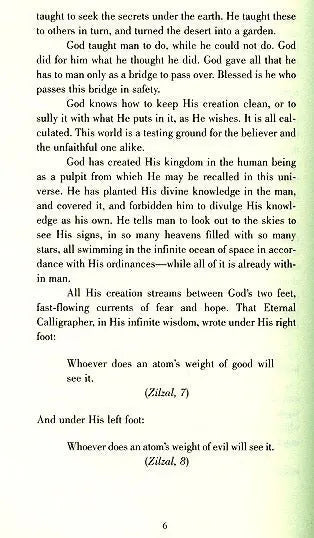Ibn ‘Arabi, the twelfth-century Spanish mystic, is considered by many the greatest master of Sufism. His large body of writings includes The Meccan Revelations (in 560 chapters) and The Bezels of Wisdom (exploring aspects of understanding through the lives of the Prophets of Islam). Contained in this volume is his powerful but little-known work, Divine Governance of the Human Kingdom, rendered into English for the first time. In a particularly startling way, the text uses metaphors from worldly politics to illuminate details of the spiritual search.
Ibn ‘Arabi wrote: "This little book contains vast knowledge of great benefit to all. It is gathered from the gardens of Eden and from divine providence. It is meant to be a guide to believers. There are neither conjectures nor doubts in it. Even if some may find faults in it, they will concede that they are small, fine, and beautiful. I call this book Divine Governance of the Human Kingdom.
"The book is divided into twenty-one chapters. Each section contains instructions for achieving unity, the Lord’s gift to humankind. They show how to keep order within the divine order while improving ourselves; how to guide our lives in the right way; how to protect His kingdom, which is the human being, from oblivion; how to rule it in the way that it is meant to be ruled, by the soul that the Lord has placed in it as His deputy. This book is a fountain that both high and low will be able to quench their thirst by drinking from it. For those who are able to see beneath the evident, there are signs that, if followed, will lead to the Source. For those who see the surface, there are things plain as could be."
Shaykh Tosun Bayrak al-Jerrahi, working from Ottoman Turkish texts of Ibn ‘Arabi’s works, has rendered this and two shorter texts, What the Seeker Needs and The One Alone, into modern English. In an Epilogue, Shaykh Tosun restates Ibn ‘Arabi’s teachings on Sufi practice and the strict duties binding a disciple to his master. Tosun Bayrak is also the author of an interpretation of ‘Abd al-Qadir al-Jilani’s The Secret of Secrets, a translation of Ibn al-Husayn al-Sulami’s Way of Sufi Chivalry and his own book, The Most Beautiful Names.
" Shaykh Tosun’s book offers an easy-to-understand interpretation of three mystical treatises by the celebrated twelfth-to-thirteenth century Sufi master Ibn ‘Arabi. The largest
Review by Samer Akkach, University of
About Author:
Muhammad Ibn 'Ali Muhyiddin Ibn 'Arabi, mystic, philosopher, poet, sage, is one of the world's great spiritual teachers. Known as Muhyiddin (the Revivifier of Religion) and the Shaykh al-Akbar (the Greatest Master), he was born in 560 AH (1165 AD) into the Moorish culture of Andalusian Spain, the centre of an extraordinary flourishing and cross-fertilization of Jewish, Christian and Islamic thought, through which the major scientific and philosophical works of antiquity were transmitted to Northern Europe. Ibn 'Arabi's spiritual attainments were evident from an early age, and he was renowned for his great visionary capacity as well as being a superlative teacher. He
He wrote over 350 works including the Fusûs al-Hikam, an exposition of the inner meaning of the wisdom of the prophets in the Judaic, Christian, Islamic line, and the Futûhât al-Makkiyya, a vast
Firmly rooted in the Quran, his work is universal, accepting that each person has a unique path to the truth, which unites all paths in itself. He has profoundly influenced the development of Islam since his time, as well as significant aspects of the philosophy and literature of the West. His wisdom has much to offer us in the modern world in terms of understanding what it means to be human.
About Translator:
Sheikh Tosun Bayrak al-Jerrahi al-Halveti (Istanbul: 1926) is an author,
A retired professor of art and art history from Fairleigh Dickinson University, New Jersey, he has exhibited widely in the United












